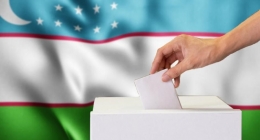In general, during the elections to representative bodies of power in 2019, the Electoral Code showed that it serves the strict observance of the constitutional electoral rights of citizens on the basis of democratic principles of justice, publicity, openness and transparency, creating the necessary conditions for voters to freely participate in elections, and political parties and their candidates - broad and equal opportunities during the election campaign.
"SECOND STEP" - ENSURING THE INDEPENDENCE OF ACTIVITIES of ELECTION COMMISSIONS AT ALL LEVELS
The "second step" of democratization of the electoral legislation and the country's system is associated with the introduction in February 2021 of the relevant amendments and additions to the legislative acts of the Republic of Uzbekistan. At the same time, special attention was paid to solving, in particular, the following priority tasks:
FIRST: ensuring the active participation in elections of all citizens, the exercise of their electoral rights, regardless of their location and temporary residence. For the first time, the procedure for including citizens of Uzbekistan living abroad in the voter list, regardless of their consular registration in diplomatic missions, as well as the legal basis for voting in portable ballot boxes at the place of residence or work of voters abroad, has been legislatively enshrined.
SECOND: further strengthening the independence of the entire system of election organizers - election commissions of all levels headed by the CEC, which is a necessary and most important condition for democratic elections. To this end, the status of members of the CEC and election commissions has been legislatively enshrined, the tasks of election commissions that are unusual for election organizers to organize meetings of candidates with voters have been excluded; the system of election commissions has been optimized - the institution of district election commissions that conduct elections to district (city) Kengashes (Councils) has been abolished. As a result of optimization, 5,739 unnecessary district election commissions are abolished, significant human resources (more than 54,000 people) are freed.
Thus, all the legal conditions have been created for the independence of election commissions from all government bodies. Today, the organizational and legal level of the elections, the legitimacy of their results, mainly depends on how accurately all the subjects of the electoral process follow the provisions of the legislation.
THIRD: creating more favorable legal conditions for political parties for campaigning, organizing all-party election events, including mass ones, for conducting an election campaign. Based on a deep study of national, foreign and international experience in ensuring democracy, fairness and fairness of elections, the constitutional terms of elections in Uzbekistan have been postponed from the first Sunday of the third decade of December to the first Sunday of the third decade of October in the year of the expiration of their constitutional term of office.
FOURTH: preventing the use of public resources during the election campaign. The OSCE / ODIHR election observation missions in various member states as priority recommendations in their final reports (for example, in the presidential elections in Georgia in 2018) indicate the need to "create a mechanism to prevent and / or effectively and timely address complaints about the abuse of administrative resources ". Taking into account the national and foreign experience in Uzbekistan, the prohibition of campaigning by civil servants (if he is not a confidant), as well as military personnel, employees of religious organizations, and judges is also legally enshrined. This is another critical step towards ensuring the impartiality, lawfulness and fairness of the elections.
Among the most important novelties of the "second step" are bringing the legislation on political parties and their financing in line with the Electoral Code, establishing a procedure for state funding of presidential and parliamentary elections, elections to local representative bodies, and reducing the time frame for appealing decisions of election commissions from 10 to 5 days.
Most importantly, the "second step" of democratization of the electoral system and the country's legislation contributes to a fuller realization of the constitutional electoral rights of citizens, the expansion of their participation in elections, and serves as the basis for holding democratic elections
"THE THIRD STEP" -- THE FORMATION OF LEGAL CONDITIONS FOR FAIR ELECTIONS







